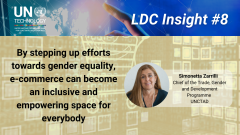- عربي
- 中文
- English
- Français
- Русский
- Español
UN Technology Bank and Network of African Science Academies launch the Angola Academy of Science to strengthen the capacity of science academies in African LDCs
angola_academy_js3.png

Gebze – The UN Technology Bank for the Least Developed Countries and The Network of African Science Academies partnered to strengthen and establish academies of sciences in African Least Developed Countries. Today, sees the launch of the Angola Academy of Science to support and advise the government in directing science and technology policies for the achievement of sustainable development goals (SDGs).
The UN Technology Bank acknowledges that science academies play a critical role in advising governments on science, technology and innovation (STI) policy development and implementation in order to address socio-economic challenges and promote development in least developed countries.
"The Angola Academy of science will serve as a partner to the government of the Republic of Angola, private sector industry and the science, technology, and innovation community. The academy will also remain pivotal in directing STI policies that support the realization of the sustainable development goals in Angola” said Joshua Setipa, UN Technology Bank's Managing Director. "Academies constitute eminent scientists who are able to provide advice to policymakers that is independent, free of vested interests, subject to peer review and evidence-based."
President of the Network of African Science Academies (NASAC), Prof. Mahouton Norbert Hounkonnou, partner of the UN Technology Bank stated that "Prosperity in life and livelihoods is realized when science interfaces with policy and society. The people of Angola have undoubtedly embraced prosperity by the proclamation of the Angolan Academy of Science.”
The Angola Academy of Science will use appropriate communication portals to inform all relevant parties of recent STI developments around the country, thus benefiting both the economy and society. The Angola Academy of Science will benefit from capacity development activities and identify opportunities by collaborating and engaging with regional, continental and global networks of academies and champion, including through south-south collaboration between academies.
In his remarks, Dr. Bornito de Sousa Baltazar Diogo, Vice President of the Republic of Angola emphasized that “It is urgent to train Teacher 4.0 and School 4.0 where we will train the children of today who will build Angola in 2050 and the 4th Industrial Revolution, based on the country’s current reality.”






